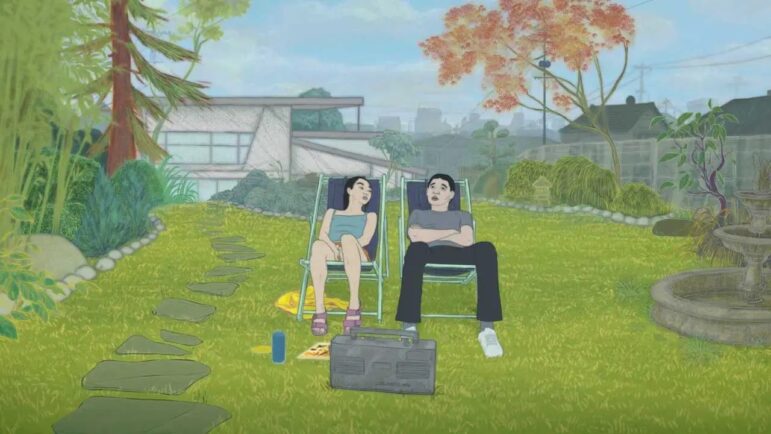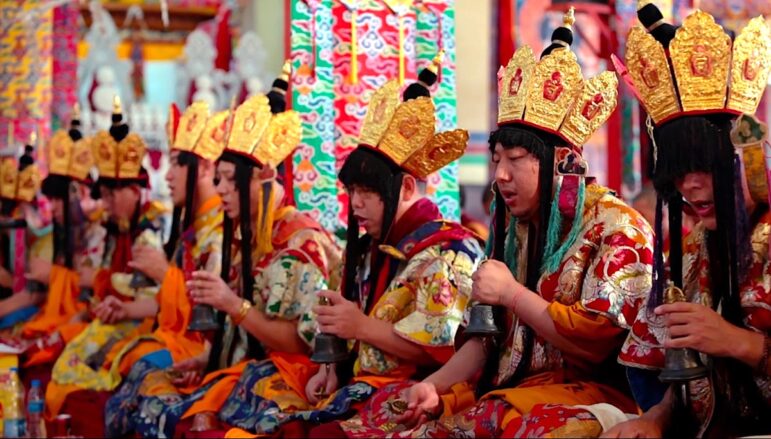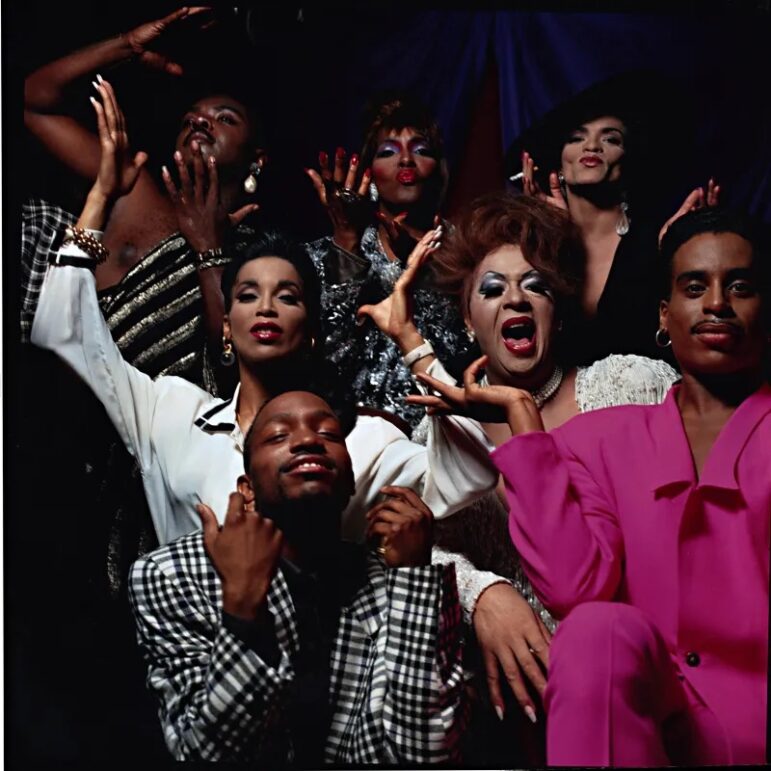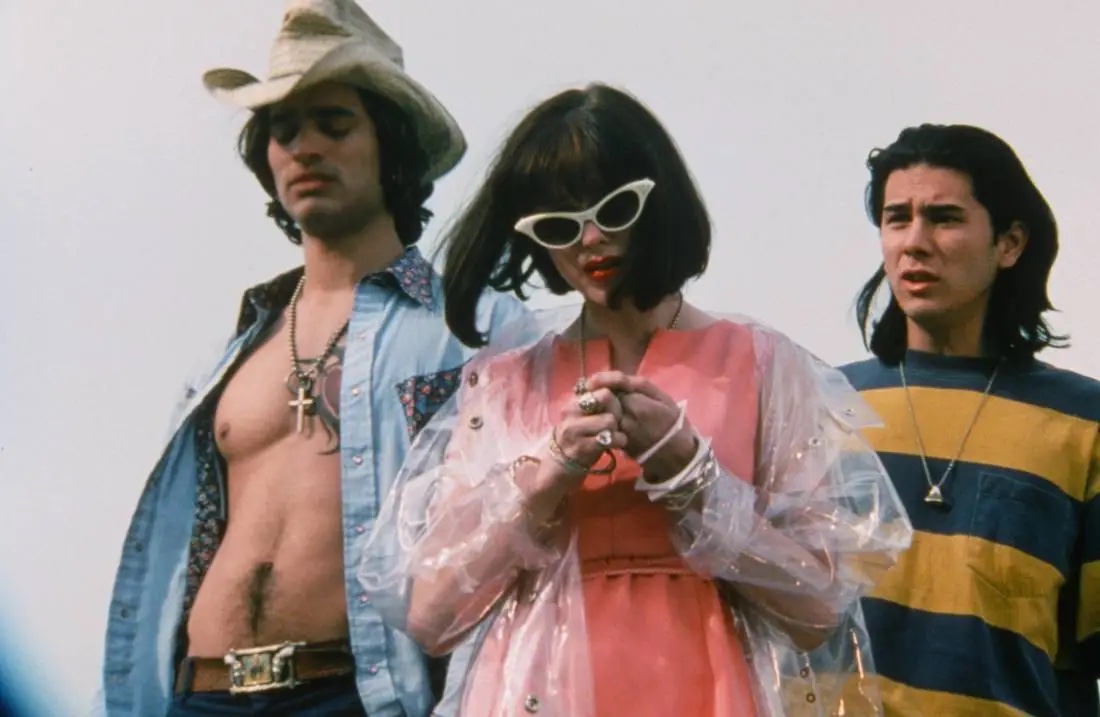The late Roger Ebert didn’t simply hate Gregg Araki’s sexually provocative, violently outrageous 1995 black comedy “The Doom Generation”—the second in the upstart filmmaker’s “Teenage Apocalypse” trilogy—he all but deep-fried it, fricasseed it, then smacked it with that critical kiss of death: zero stars.
Didn’t deserve it.
But the legendary, revered Ebert was not alone in his disdain for the raucous (and in my opinion extraordinary) road picture raunchfest wherein a trio of disaffected, very sexy Gen-X youths (Rose McGowan, Johnathon Schaech, James Duval) fool around with each other while leaving a long trail of bloody body parts in their wake during a time of fear and loathing.
To be fair, some praised its unbridled threesome sexuality and Araki’s distinctive, unsparing creative vision, and insane style—particularly given it was a shot-on-the-cheap ($800,000) production.
Even with the savage studio cuts that took the sting and steam out of the theatrical release’s most extreme sequences, the movie made an impression and went on to become a cult classic. Many lumped it into the same rogue league as Oliver Stone’s self-serious 1994 “Natural Born Killers” with Woody Harrelson and Juliette Lewis and Dominic Sena’s 1993 killers-on-the-road “Kalifornia” with Brad Pitt and, again, Lewis.
Fast forward to the Sundance Film Festival, the launching pad for indie films where “The Doom Generation” originally was shown. It screened again this year, and the reaction was vastly different for the gorgeous-to-behold 4K restoration which brings back those objected-to scenes and remasters the sound quality to perfection. It received a warm and welcoming embrace, unlike what happened when it first hit theaters and got eviscerated by some critics.
The 63-year-old Araki, who has made a career out of low-budget indies that defy expectations, said something about fluid sexuality that was not talked about “back then.”
At last, he is receiving the respect he deserves. After all, he helped nurture the careers of stars such as Parker Posey, Margaret Cho, Ryan Phillippe, and Joseph Gordon-Levitt. He is also the first recipient of the Cannes Film Festival’s Queer Palm award, given to an LGBTQ-themed feature, for his immensely enjoyable 2010 feature “Kaboom.”
Araki, who oversaw the restoration of “The Doom Generation,” is finally seeing the film presented in the way he intended.
The changes make the arousing feature more vibrant and pertinent. It’s a rebellious scream at an era that was filled with numbness, fear of AIDS and general discontent, a time that produced a pretty-boy drifter (Schaech) without a cause and a conscience, who manages to wedge his way into the bored, zonked-out lives of two lovers Amy and Jordan (McGowan and Duval) whose sex life lacks spark. It’s filled with LOL dialogue, including this exchange when naïve Jordan who might just be more in lust with guys, asks his more aware, streetwise lover Amy, “Ever feel that reality is more twisted than ‘shrooms?”
The restored scenes, along with the remastered sound and the seductive visuals, intensify the sensory experience. The movie is not only one of the year’s best restorations, it’s one of the best indie releases you’re likely to see in 2023.
For a limited time, San Francisco’s Alamo Drafthouse is showing the film. Araki and Duval appear in a Q&A this weekend (Friday is sold out, Saturday has tickets). For details, visit https://drafthouse.com/sf/event/live-q-a-the-doom-generation?cinemaId=0801.
There is another alternative at the Roxie in San Francisco. Fans of literary sensation Haruki Murakami may want to see director Pierre Földes’ “Blind Willow, Sleeping Woman,” an animated anthology based on the award-winning author’s short stories, including “The Wind-up Bird and Tuesday’s Women,” “Super Frog Saves Tokyo,” “UFO in Kushiro,” “Birthday Girl,” “Dabchick,” and “Blind Willow, Sleeping Woman.” The surreal stories were inspired by the 2011 Tokyo quake and tsunami, which killed about 18,500.

Murakami’s work recently got turned into Ryusuke Hamaguchi’s “Drive My Car,” which took home, deservedly so, the 2022 Oscar for best international feature.
For tickets and information about “Blind Willow, Sleeping Woman,” visit https://roxie.com/film/blind-willow-sleeping-woman/
At the Smith Rafael Film Center, the Buddhist Film Foundation and the California Film Institute have teamed up for 2023 International Buddhist Film Festival. It launches Sunday with “Ganden: A Joyful Land,” a documentary that covers the last remaining generation of Tibetan Buddhist monks who studied at the Ganden Monastery in Tibet. Award-winning director Ngawang Choephel will attend the 4:30 p.m. screening for an onstage conversation afterward.

Other upcoming films include director Ella Manzheeva’s “Geshe Wangyal. With Blessing of the Three Jewels” (May 21); director Helen Whitney’s “Into the Night: Portraits of Life and Death Part Two” (June 18); Bay Area director Rosemary Rawcliffe’s festival favorite “The Great 14th Tenzin Gyatso, the 14th Dalai Lama in His Own Words” (July 9) and director Jim Huaqing’s six-years-in-the-making “Dark Red Forest” (Sept. 17).
All screenings are at the Smith Rafael Film Center, 1118 Fourth St., San Rafael, with filmmakers and guests scheduled to attend. For more information, visit https://rafaelfilm.cafilm.org/ganden/.

If you want to see older films that ring with contemporary relevance, the Berkeley Art Museum and Pacific Film Archive provide. The 1990 classic documentary “Paris Is Burning” takes an invigorating look at the 1980s drag ball scene in New York City. Fans of “RuPaul’s Drag Race” (and who isn’t?) will enjoy this time capsule capturing great performances that elevated the voices and the culture of a diverse LGBTQ community. As a bonus, Allegra Madsen, director of programming at Frameline LGBTQ+ film festival in the Bay Area, will introduce the film, and Berkeley historian-filmmaker Jenni Olson will join Susan Stryker, professor emerita of Gender and Women’s Studies at the University of Arizona to discuss director Jennie Livingston’s seminal work. It is screening at 7 p.m. on Thursday. For tickets, https://bampfa.org/event/paris-burning.
Should you be intrigued— I am certainly—about the chameleon-like qualities of Ukranian director Kira Muratova’s 1989 hybrid “The Asthenic Syndrome,” which futzes with documentary and fiction to craft a stinging indictment about the insanity of 1980s Soviet Union, grab a PFA ticket for Friday’s 7 p.m. screening. Be prepared: Muratova’s sixth unconventional feature clocks in at just over 2 1/2 hours. Visit https://bampfa.org/event/asthenic-syndrome-muratova.
